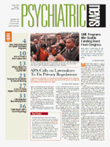106th Congress Review
Before turning to the new administration and Congress, I thought it would be useful to provide a brief review of the recently adjourned 106th Congress.
• Medicare Funding
Congress and the White House reached agreement in mid-December on legislation that increases Medicare funding by about $35 billion. Notably, the bill includes an expansion of telemedicine services, mandating payment for a specific range of CPT codes including a host of psychiatric services. Services would have to be provided in designated areas, generally rural areas designated health-professional shortage areas, or existing telemedicine demonstration projects.
• Psychiatric Research Funding
Congress finally cleared legislation funding for the National Institutes of Health (NIH) and the individual institutes in mid-December, in the process handing APA and our allies an important victory in our multiyear strategy to double the NIH research budget by 2003. Overall, NIH funding was increased by $2.5 billion for FY 2001, a 14.2 percent increase. Funding for the National Institute of Mental Health (NIMH) and the National Institute on Drug Abuse (NIDA) is up about 14 percent; funding for the National Institute on Alcoholism and Alcohol Abuse (NIAAA) is up more than 16 percent.
• Physicians’ and Patients’ Bill of Rights
Despite House and Senate passage of widely different bills addressing problems in managed care, Congress failed to reach a compromise. APA lobbying secured an important victory that should yield dividends in the months ahead, when we were able to persuade House GOP leaders to change legislation to ensure that psychiatric patients would not potentially be excluded from access to the courts.
• Medicare Prescription Drug Coverage
House-passed legislation to establish a new prescription drug benefit under the Medicare program died at the end of the 106th Congress when the Senate failed to take any action. The House bill relied on private insurance to develop coverage. This issue will clearly be a priority for the Bush administration. APA will continue to lobby to ensure that nondiscriminatory coverage of psychotropic medications is a feature of any Medicare drug coverage plan.
• Physician Antitrust Reform
APA-supported legislation permitting individual physicians to band together to collectively bargain with managed care plans easily passed the House last year but was never taken up by the Senate. Although the bill’s chief sponsor, Representative Tom Campbell, failed in his Senate bid and thus did not return to Congress, APA will work with AMA to find new sponsors for the bill.
• Medicare Parity
Working closely with APA’s DGR staff, Representative Marge Roukema (R-N.J.) introduced a bill to repeal Medicare’s historic discriminatory 50 percent copayment requirement for outpatient psychotherapy. The bill was reintroduced last month (see next issue of Psychiatric News). DGR will provide a bridge between Representative Roukema and the larger mental health community; last year more than 40 national mental health groups signed a DGR-originated letter of support for the legislation.
• Seclusion and Restraint
Culminating a two-year struggle, Congress passed legislation last fall to establish additional federal standards for the use of seclusion and restraint in hospital and nonhospital settings. While APA would have preferred that no additional standards be implemented in this area, we were successful in leading a coalition of hospital and health groups to defeat stringent and clinically inappropriate restrictions.
• Privacy
At an invitation-only ceremony hosted by President Clinton and attended by APA Medical Director Steven Mirin, M.D., the Clinton administration unveiled a massive 1,500-page regulation to protect medical privacy (Psychiatric News, February 2). Key is a requirement that patients give informed written consent before their medical records are divulged to others. The final regulation will be fully implemented within two years. President Clinton specifically acknowledged to the attendees—in particular to Dr. Mirin—the importance of strong privacy protections to psychiatric patients when he noted, “Nothing is more private than someone’s medical and psychiatric records.”
What’s Ahead in the New 107th Congress
Let me now take a look at the new 107th Congress. The deep national divisions reflected in the outcome of the Presidential election are also reflected in the makeup of the Congress. The Senate faces an unprecedented 50/50 split, resulting in an extraordinary power-sharing arrangement under which Republicans and Democrats will have equal representation on committees, but the Vice President’s tie-breaking vote is a hedge against gridlock. One likely outcome of the split control is that prospects for a strong patient protection bill have substantially improved, since several key opponents of a strong bill were defeated in November.
• In the House, term limits have resulted in changes in key House committees, including Ways and Means and Commerce. These changes have potentially important consequences for legislation of interest to APA. New Ways and Means Committee Chair Bill Thomas (R-Calif.), for example, is widely regarded as an expert in health policy, a strong advocate for major overhaul of the Medicare program, and the chief architect behind last year’s House-passed prescription drug coverage bill. His selection as chairman is a good indication that the House leadership is priming the pump for early action on key health policy initiatives from the Bush administration.
• I think it is a given that the President will actively promote private market-based solutions to a host of pressing health problems, such as prescription drug coverage for Medicare and expanding coverage of the uninsured. In confirmation testimony before the Senate Finance Committee, Wisconsin Governor Tommy Thompson, recently installed as secretary of the Department of Health and Human Services, promoted the idea of state-based, flexible solutions for the 42 million Americans who have no health insurance. The administration’s likely approach will include a combination of $2,000 refundable tax credits to help purchase insurance, incentives to small employers to band together to enjoy economies of scale when seeking insurance for their employees, and state-run, federally supported, stopgap coverage for the working poor. Prescription drug coverage will be a tougher sell. President Bush will propose a stopgap $12 billion program of subsidies to low-income seniors for their drug costs, while the administration and Congress grapple with comprehensive drug coverage under Medicare as part of larger structural reform of the program. That proposal prompted quick criticism from senators of both parties.
• In welcome news for APA, Thompson reiterated the Bush administration’s strong support for doubling the NIH research budget by 2003, noting that “each day brings us ever closer to the scientific breakthroughs that are the keys to preventing and treating a host of diseases affecting patients and their families including cancer, AIDS, Parkinson’s disease, and mental illness.”
APA/DGR Priorities
These are among the APA and DGR legislative and regulatory priorities for the new Congress:
• Securing reintroduction of legislation to repeal Medicare’s discriminatory 50 percent copayment requirement for outpatient psychiatric services under Part B.
• Developing a response to Medicare’s lack of coverage for so-called “intermediate-level” psychiatric services (for example, residential and nonresidential care that is less than hospital-level intensity, but more intensive than outpatient office-based treatment) and addressing the discriminatory 190-day lifetime limit on inpatient treatment in a psychiatric hospital.
• Continuing our active support for a strong physicians’ and patients’ bill of rights, with emphasis on ensuring that provisions do not discriminate against psychiatric patients.
• Working to ensure that any Medicare prescription drug package includes nondiscriminatory coverage of psychotropic medications.
• Assessing wide variations in Medicare carrier coverage of psychiatric services. Where appropriate, seeking positive resolution via regulatory or legislative fixes. We have already had very productive meetings with the staff of the Medicare Payment Advisory Commission to alert them to continuing problems with Medicare’s response to psychiatric coverage issues.
• Securing passage of mental health parity legislation that repeals the current September 2001 sunset date of the Mental Health Parity Act and expands the scope-of-parity requirements.
• Lobbying for inclusion of nondiscriminatory utilization review requirements as part of parity or managed care reform legislation.
• Vigorously resisting efforts of unqualified mental health professionals to use federal programs through legislative and regulatory initiatives to advance their scope of practice and supporting district branches and state associations in their efforts to defeat similar state legislation.
• Continuing to advocate for increased federal commitment to funding research on causality and effective treatments for mental illnesses and substance abuse disorders via NIMH, NIDA, and NIAAA.
• Working to prevent discrimination against and marginalization of children with attention deficit/hyperactivity disorder in educational settings and health systems.
• Continuing to work for revisions in seclusion and restraint regulations for inpatient hospital care including clarifying the role of medical residents and address future seclusion and restraint regulations in other settings. APA is already spearheading an effort to get the Health Care Financing Administration to withdraw a new rule on restraint and seclusion in residential treatment centers.
• Continuing to provide a coordinated APA effort to ensure the appropriate recognition of psychiatry services in the Medicare fee schedule.
The arrival of a new President and new Congress presents great opportunities to APA and all of medicine. The Bush administration is already signaling its intention not only to defuse the too-often-adversarial nature of the relationship between the Medicare and Medicaid bureaucracies and physicians, hospitals, and other health groups, but also to support a doubling of the NIH research budget. These are welcome developments. We will undoubtedly need your help in making our priorities realities in the coming year. I look forward to working with you and hope you will always feel free to contact DGR if we can be of assistance. Please call us at (202) 682-6043. ▪

